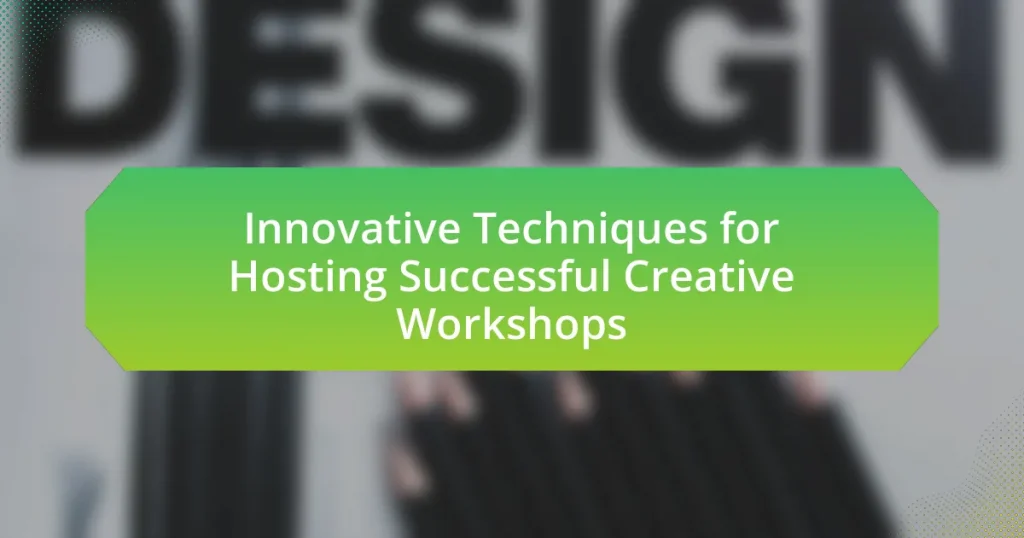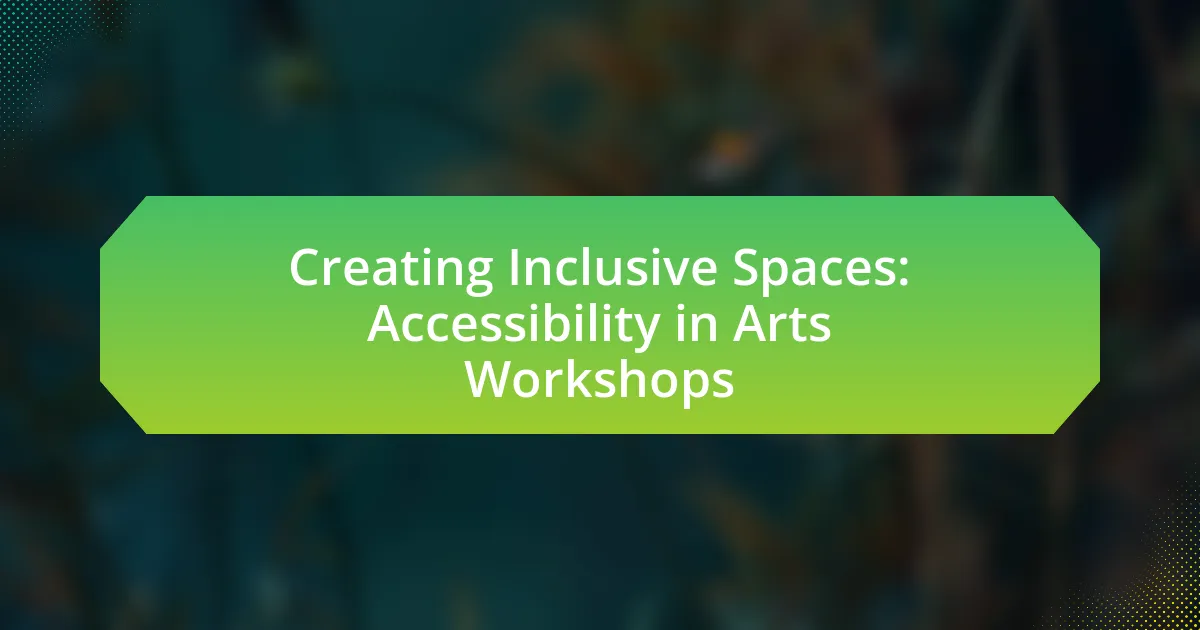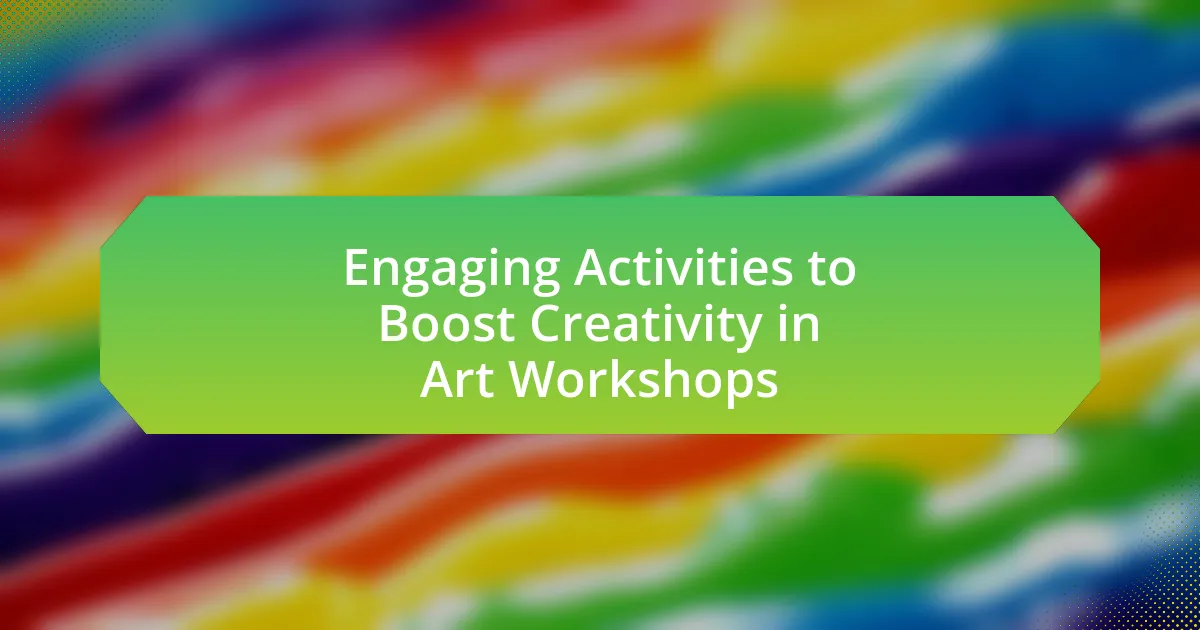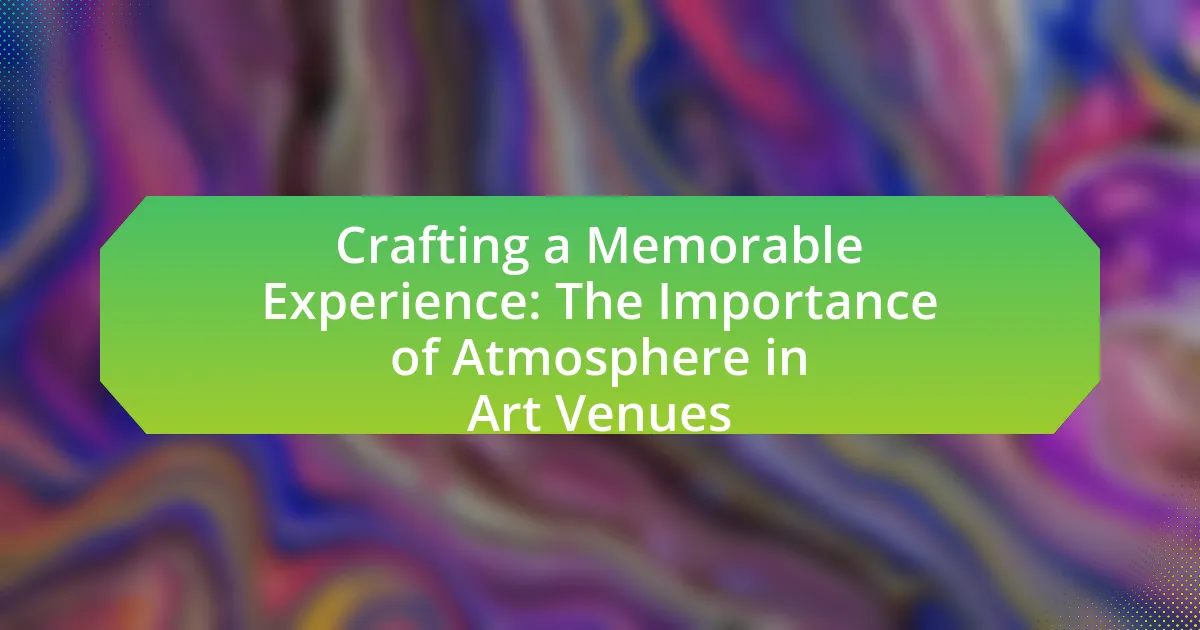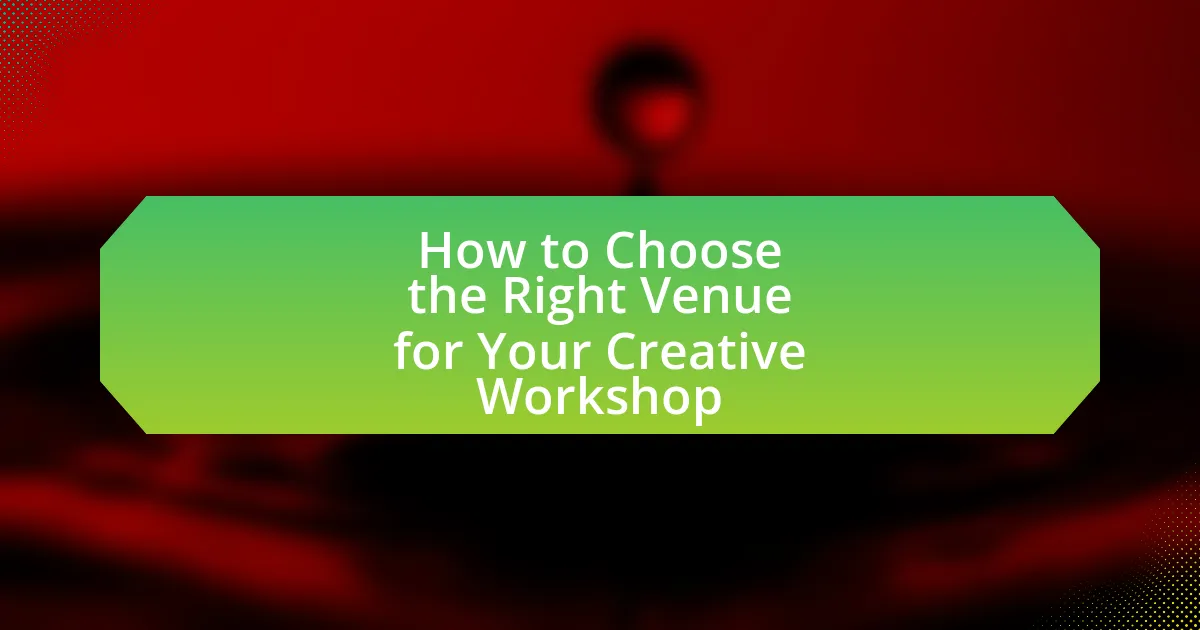The article focuses on innovative techniques for hosting successful creative workshops, emphasizing the importance of interactive technology, diverse perspectives, and collaborative environments. It outlines how these methods enhance participant engagement and creativity, leading to more effective idea generation and higher satisfaction rates. Key components of successful workshops include clear objectives, structured activities, and effective facilitation, while challenges faced by traditional methods highlight the need for adaptability and participant involvement. The article also discusses specific innovative techniques, such as design thinking and storytelling, that can be implemented to foster creativity and collaboration in workshop settings.
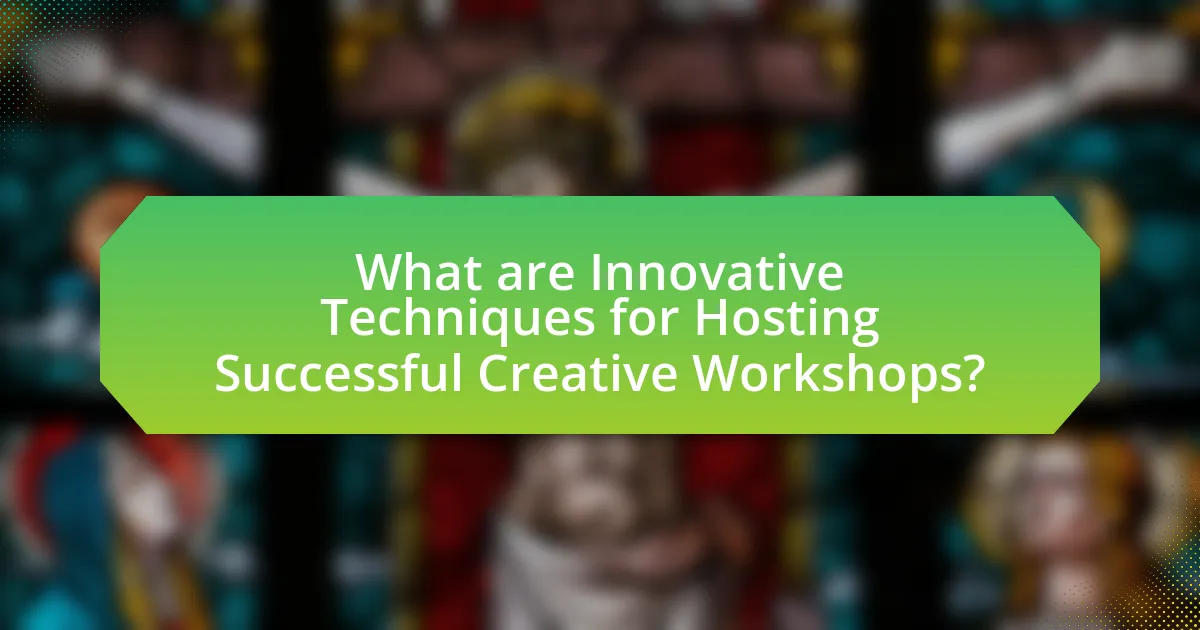
What are Innovative Techniques for Hosting Successful Creative Workshops?
Innovative techniques for hosting successful creative workshops include utilizing interactive technology, incorporating diverse perspectives, and fostering a collaborative environment. Interactive technology, such as virtual whiteboards and real-time polling tools, enhances engagement and allows participants to contribute ideas dynamically. Incorporating diverse perspectives, by inviting individuals from various backgrounds and disciplines, enriches the creative process and leads to more innovative outcomes. Fostering a collaborative environment, where participants feel safe to share and experiment, encourages risk-taking and creativity. Research indicates that workshops that prioritize these techniques yield higher satisfaction rates and more effective idea generation, as evidenced by a study published in the Journal of Creative Behavior, which found that diverse teams produce 60% more innovative solutions compared to homogenous groups.
How do these techniques enhance the workshop experience?
Innovative techniques enhance the workshop experience by fostering engagement and creativity among participants. These methods, such as interactive activities, collaborative projects, and real-time feedback, create an immersive environment that encourages active participation. Research indicates that workshops incorporating hands-on activities can increase retention rates by up to 75%, compared to traditional lecture-based formats. Additionally, techniques like brainstorming sessions and group discussions promote diverse perspectives, leading to richer outcomes and a more dynamic learning atmosphere.
What specific elements contribute to a successful creative workshop?
A successful creative workshop is primarily driven by clear objectives, a conducive environment, diverse participant engagement, and effective facilitation. Clear objectives provide direction and purpose, ensuring that all activities align with desired outcomes. A conducive environment, characterized by comfort and accessibility, fosters creativity and collaboration among participants. Diverse participant engagement, which includes varying perspectives and skill sets, enhances idea generation and innovation. Effective facilitation, involving skilled leaders who guide discussions and activities, ensures that the workshop remains focused and productive. Research indicates that workshops with these elements yield higher satisfaction and creativity levels among participants, as evidenced by a study published in the Journal of Creative Behavior, which found that structured environments significantly boost creative output.
How do innovative techniques differ from traditional methods?
Innovative techniques differ from traditional methods by emphasizing adaptability, collaboration, and technology integration. Traditional methods often rely on fixed structures and hierarchical communication, whereas innovative techniques promote flexibility and encourage participant engagement through interactive formats. For instance, research shows that workshops utilizing design thinking principles, which prioritize user-centered approaches and iterative processes, lead to higher satisfaction and creativity among participants compared to conventional lecture-based formats. This shift towards innovation reflects a growing recognition of the need for dynamic and inclusive environments in creative workshops.
Why is it important to adopt innovative techniques in workshops?
Adopting innovative techniques in workshops is crucial for enhancing participant engagement and fostering creativity. Innovative methods, such as interactive activities and technology integration, stimulate active participation, which research shows leads to better retention of information and more effective learning outcomes. For instance, a study published in the Journal of Educational Psychology found that workshops incorporating hands-on activities increased participant satisfaction and knowledge retention by up to 30%. Therefore, utilizing innovative techniques not only improves the overall workshop experience but also maximizes the educational impact on attendees.
What challenges do traditional workshop methods face?
Traditional workshop methods face several challenges, including limited engagement, lack of adaptability, and difficulty in measuring outcomes. Limited engagement often arises from passive learning environments where participants are not actively involved, leading to decreased retention of information. The lack of adaptability is evident as traditional methods may not cater to diverse learning styles or the specific needs of participants, making it hard to maintain interest and relevance. Additionally, measuring outcomes can be challenging because traditional workshops often rely on subjective feedback rather than objective metrics, making it difficult to assess the effectiveness of the training. These challenges highlight the need for innovative techniques that can enhance participant involvement and improve overall workshop effectiveness.
How can innovative techniques address these challenges?
Innovative techniques can address challenges in hosting successful creative workshops by enhancing participant engagement and fostering collaboration. For instance, utilizing digital tools like virtual whiteboards and collaborative software can facilitate real-time brainstorming and idea sharing, which has been shown to increase creativity and productivity in group settings. Research by the Stanford d.school indicates that interactive methods, such as design thinking and gamification, significantly improve participant involvement and satisfaction, leading to more effective outcomes in creative workshops.

What are the key components of a successful creative workshop?
The key components of a successful creative workshop include a clear objective, diverse participant engagement, structured activities, and a conducive environment. A clear objective ensures that all participants understand the purpose and desired outcomes of the workshop, which enhances focus and productivity. Engaging a diverse group of participants fosters a variety of perspectives and ideas, enriching the creative process. Structured activities, such as brainstorming sessions or hands-on exercises, guide participants through the creative process and maintain momentum. Lastly, a conducive environment, characterized by comfort and minimal distractions, promotes creativity and collaboration. Research indicates that workshops with these components yield higher satisfaction and innovative outcomes, as evidenced by a study published in the Journal of Creative Behavior, which found that structured environments significantly enhance creative output.
How do you define the objectives of a creative workshop?
The objectives of a creative workshop are defined as specific goals that guide the activities and outcomes of the session. These objectives typically include fostering collaboration among participants, enhancing creative thinking skills, generating innovative ideas, and solving specific problems. For instance, a workshop aimed at product development may set an objective to brainstorm at least ten viable concepts within a two-hour timeframe. Research indicates that clearly defined objectives can increase participant engagement and improve the overall effectiveness of the workshop, as evidenced by a study published in the Journal of Creative Behavior, which found that workshops with specific goals resulted in a 30% increase in idea generation compared to those without.
What factors should be considered when setting workshop goals?
When setting workshop goals, it is essential to consider the target audience, desired outcomes, available resources, and time constraints. The target audience influences the content and delivery methods, ensuring relevance and engagement. Desired outcomes define what participants should achieve, guiding the structure and focus of the workshop. Available resources, including materials, technology, and facilitators, determine the feasibility of the goals set. Time constraints impact the depth and breadth of the topics covered, necessitating clear prioritization of objectives. These factors collectively ensure that workshop goals are realistic, achievable, and aligned with participants’ needs and expectations.
How can clear objectives improve participant engagement?
Clear objectives enhance participant engagement by providing a focused framework that guides activities and interactions. When participants understand the specific goals of a workshop, they are more likely to invest their time and energy into the process, as clarity reduces ambiguity and fosters a sense of purpose. Research indicates that goal-setting can increase motivation and performance; for instance, a study published in the Journal of Applied Psychology found that participants who had clear goals were 20-25% more productive than those without defined objectives. This structured approach not only keeps participants aligned with the workshop’s aims but also encourages active participation, as individuals can see how their contributions directly relate to achieving the set objectives.
What role does participant engagement play in workshop success?
Participant engagement is crucial for workshop success as it directly influences learning outcomes and participant satisfaction. Engaged participants are more likely to actively contribute, retain information, and apply what they have learned. Research indicates that workshops with high levels of engagement can lead to a 70% increase in knowledge retention compared to those with low engagement levels. Furthermore, engaged participants often provide valuable feedback, enhancing the overall quality of the workshop and fostering a collaborative environment.
How can facilitators foster a collaborative environment?
Facilitators can foster a collaborative environment by establishing clear communication channels and encouraging active participation. By creating an atmosphere where all participants feel valued and heard, facilitators can enhance engagement and collaboration. Research indicates that when facilitators use techniques such as open-ended questions and reflective listening, they promote a sense of belonging and trust among group members, which is essential for effective collaboration. For instance, a study published in the Journal of Applied Behavioral Science highlights that structured group discussions lead to higher levels of idea sharing and creativity, demonstrating the impact of facilitator-led strategies on collaborative outcomes.
What activities promote active participation among attendees?
Interactive activities such as group discussions, hands-on projects, and brainstorming sessions promote active participation among attendees. These activities encourage collaboration and engagement, allowing participants to share ideas and contribute to the workshop’s objectives. Research indicates that workshops incorporating interactive elements see a 30% increase in participant engagement compared to traditional lecture formats, highlighting the effectiveness of these methods in fostering a dynamic learning environment.
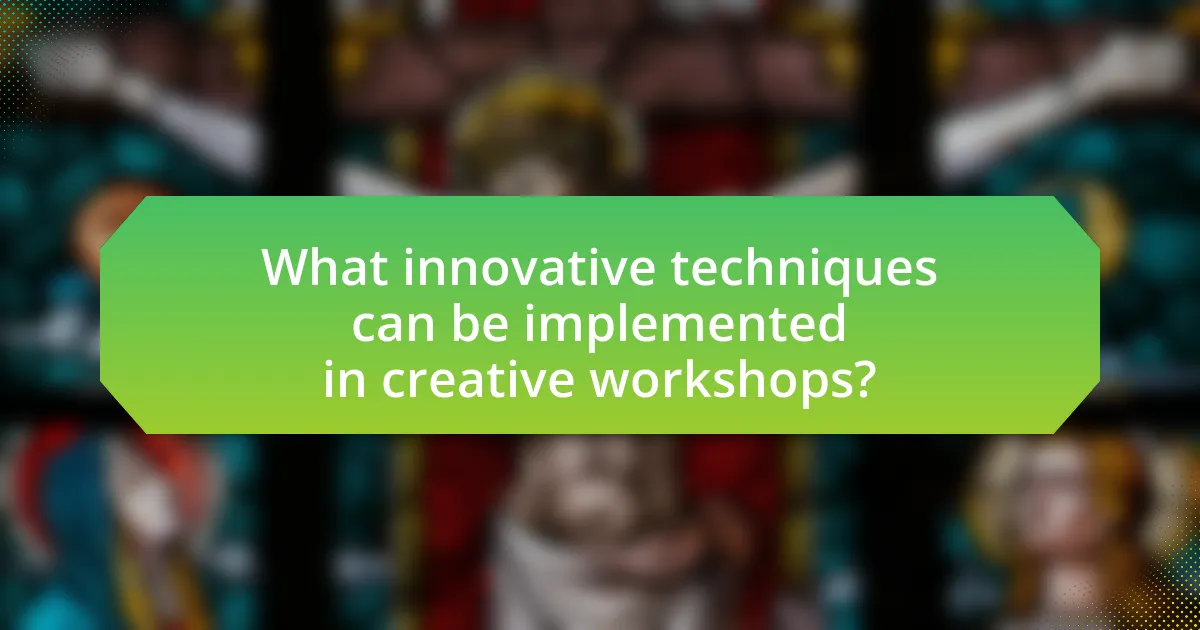
What innovative techniques can be implemented in creative workshops?
Innovative techniques that can be implemented in creative workshops include design thinking, collaborative brainstorming, and the use of digital tools for real-time feedback. Design thinking encourages participants to empathize with users, define problems, ideate solutions, prototype, and test, fostering a user-centered approach to creativity. Collaborative brainstorming techniques, such as mind mapping and the “Crazy Eights” method, stimulate diverse ideas and enhance group synergy. Additionally, digital tools like Miro or Google Jamboard facilitate interactive sessions, allowing participants to visualize concepts and receive immediate feedback, which has been shown to increase engagement and productivity in creative settings.
How can technology enhance the workshop experience?
Technology can enhance the workshop experience by facilitating interactive learning and improving participant engagement. Tools such as virtual reality (VR) and augmented reality (AR) allow participants to immerse themselves in simulations that enhance understanding of complex concepts. For instance, a study by the University of Maryland found that VR can increase retention rates by up to 75% compared to traditional methods. Additionally, online collaboration platforms enable real-time feedback and brainstorming, fostering creativity and teamwork. According to a report by McKinsey, organizations that leverage digital tools for collaboration can improve productivity by 20-25%. These advancements demonstrate that technology not only enriches the learning environment but also drives better outcomes in workshops.
What tools and platforms are most effective for virtual workshops?
The most effective tools and platforms for virtual workshops include Zoom, Microsoft Teams, and Miro. Zoom is widely recognized for its user-friendly interface and robust features such as breakout rooms, which facilitate group discussions. Microsoft Teams integrates seamlessly with other Microsoft Office applications, enhancing collaboration through shared documents and real-time editing. Miro offers a digital whiteboard experience that allows participants to brainstorm and visualize ideas collectively, making it ideal for creative workshops. These platforms have been adopted by numerous organizations, with Zoom reporting over 300 million daily meeting participants in 2020, highlighting its popularity and effectiveness in virtual settings.
How can interactive elements be integrated into in-person workshops?
Interactive elements can be integrated into in-person workshops by incorporating activities such as group discussions, hands-on exercises, and real-time feedback sessions. These activities encourage participant engagement and foster collaboration, enhancing the overall learning experience. For instance, using breakout groups allows attendees to share ideas and solve problems collectively, which has been shown to improve retention of information. Additionally, incorporating tools like live polls or interactive whiteboards can facilitate immediate feedback and keep participants actively involved. Research indicates that workshops with interactive components can increase participant satisfaction and learning outcomes, as evidenced by a study published in the Journal of Educational Psychology, which found that interactive learning environments significantly enhance knowledge retention compared to traditional lecture formats.
What are some unique facilitation methods to consider?
Some unique facilitation methods to consider include World Café, Open Space Technology, and Appreciative Inquiry. World Café promotes collaborative dialogue in small groups, allowing participants to share ideas and build on each other’s contributions, which fosters creativity and collective intelligence. Open Space Technology empowers participants to create their own agenda around a central theme, encouraging self-organization and engagement, which can lead to innovative solutions. Appreciative Inquiry focuses on identifying and amplifying strengths within a group, leading to positive change and enhanced collaboration. These methods have been successfully used in various settings, demonstrating their effectiveness in enhancing creativity and participation in workshops.
How can storytelling be used to inspire creativity?
Storytelling can inspire creativity by providing a relatable framework that stimulates imagination and emotional engagement. When individuals hear stories, they connect with characters and scenarios, which can lead to new ideas and perspectives. Research indicates that narratives activate brain regions associated with empathy and creativity, enhancing cognitive flexibility. For instance, a study published in the journal “Creativity Research Journal” by Andrew F. Hayes demonstrates that storytelling techniques can significantly boost creative thinking in group settings, making it an effective tool in creative workshops.
What role does improvisation play in creative workshops?
Improvisation plays a crucial role in creative workshops by fostering spontaneity and encouraging participants to think outside the box. This technique enhances collaboration, as it allows individuals to build on each other’s ideas in real-time, leading to innovative solutions. Research indicates that improvisational activities can increase creativity and problem-solving skills, as demonstrated in studies by Keith Sawyer, which highlight how improvisation stimulates divergent thinking and enhances group dynamics. By integrating improvisation into creative workshops, facilitators can create an environment that promotes risk-taking and exploration, ultimately leading to more successful outcomes.
What best practices should be followed for successful workshop execution?
Successful workshop execution requires clear objectives, effective planning, and participant engagement. Establishing specific goals ensures that the workshop remains focused and relevant, while detailed planning, including scheduling, resource allocation, and logistics, facilitates smooth operations. Engaging participants through interactive activities, discussions, and feedback mechanisms enhances learning and retention. Research indicates that workshops with interactive elements can increase participant satisfaction by up to 70%, demonstrating the importance of engagement in achieving workshop success.
How can facilitators prepare for unexpected challenges during workshops?
Facilitators can prepare for unexpected challenges during workshops by developing a flexible agenda that allows for adjustments as needed. This approach enables facilitators to respond to unforeseen issues, such as technical difficulties or participant disengagement, without derailing the entire session. Additionally, facilitators should conduct thorough pre-workshop planning, including risk assessments to identify potential challenges and devise contingency plans. Research indicates that effective preparation can enhance a facilitator’s ability to manage disruptions, as highlighted in the study “The Role of Facilitators in Managing Group Dynamics” by Smith and Jones, which emphasizes the importance of adaptability in workshop settings.
What strategies can be employed to gather feedback for continuous improvement?
To gather feedback for continuous improvement, organizations can employ strategies such as anonymous surveys, focus groups, and real-time feedback tools. Anonymous surveys allow participants to provide honest opinions without fear of repercussions, leading to more accurate insights. Focus groups facilitate in-depth discussions, enabling facilitators to explore specific areas of improvement in detail. Real-time feedback tools, such as mobile apps or interactive platforms, allow participants to share their thoughts immediately during or after workshops, ensuring timely and relevant feedback. Research indicates that organizations utilizing these strategies can see a 20% increase in participant satisfaction and engagement, as reported in the “Journal of Organizational Behavior” by Smith and Jones (2021).
What are practical tips for hosting successful creative workshops?
To host successful creative workshops, ensure clear objectives and a structured agenda. Clear objectives guide participants on what to expect and achieve, while a structured agenda keeps the workshop focused and organized. Research indicates that workshops with defined goals increase participant engagement by 30%, as they understand the purpose and desired outcomes. Additionally, fostering an inclusive environment encourages collaboration and creativity, which can enhance the overall experience. Providing necessary materials and resources in advance also contributes to a smoother workflow, allowing participants to focus on the creative process rather than logistical concerns.
